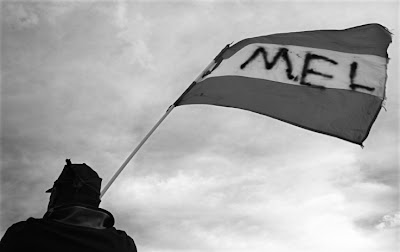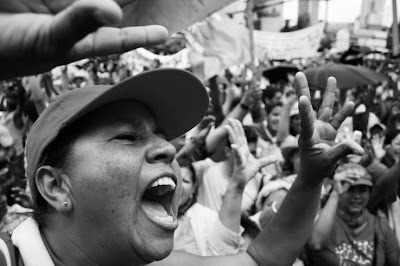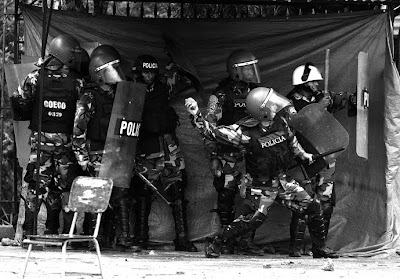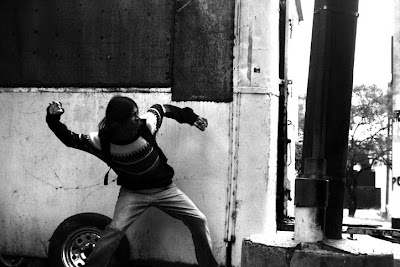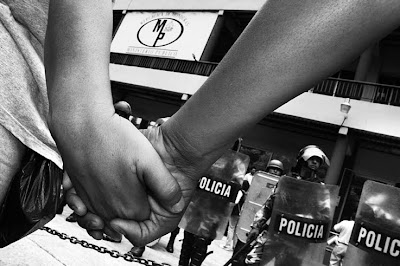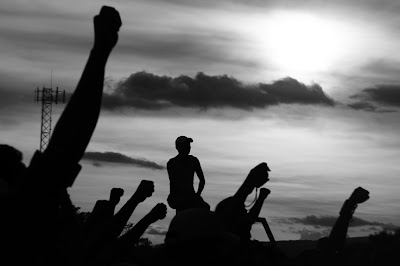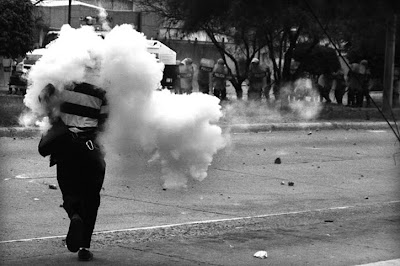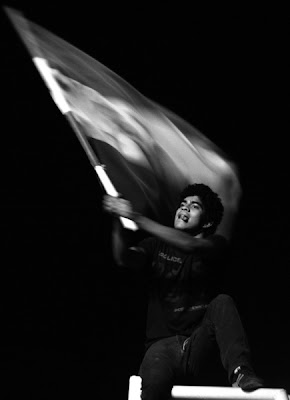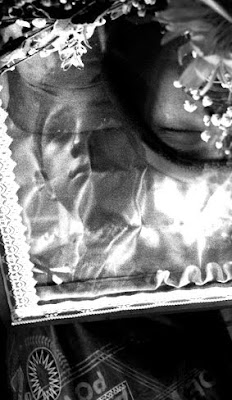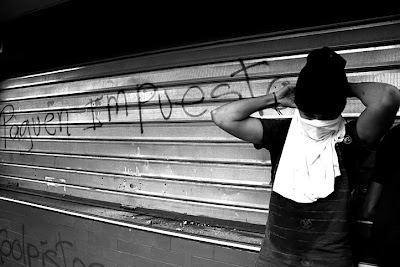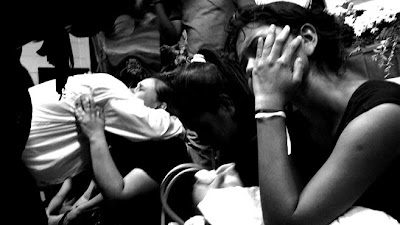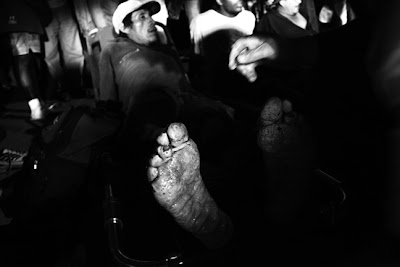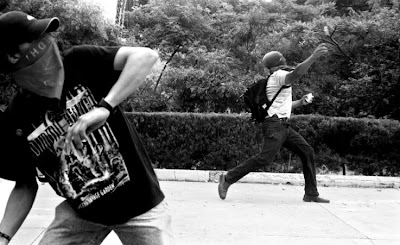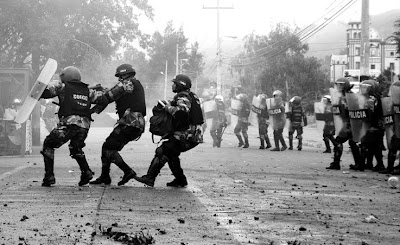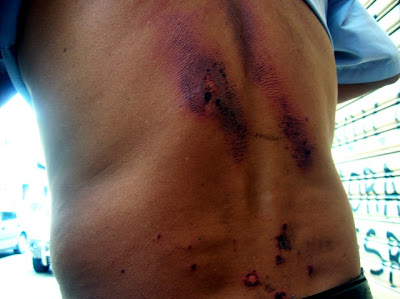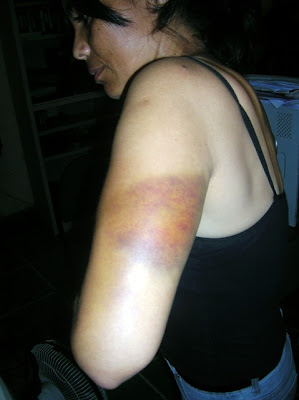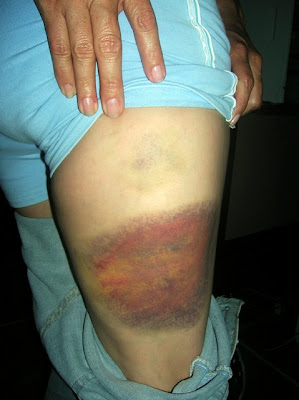http://www.justforeignpolicy.org/node/354
Popular Resistance to the Coup in Honduras: an Interview with Bertha Caceres
Submitted by robert naiman on 27 September 2009 - 1:42pm
This interview with Honduran human rights activist Bertha Caceres was conducted on September 4 by Beverly Bell, author of
Walking on Fire: Haitian Women's Stories of Survival and Resistance and Program Coordinator of Other Worlds.
Bertha Caceres is a co-founder of COPINH, the Council of Popular and Indigenous Organizations in Honduras. COPINH addresses human rights issues such as the impunity of large land-owners and the forced eviction of campesinos; illegal de-forestation by corporations; and compensation for victims of human rights violations committed by the Honduran government.
Beverly Bell: Here we are in Havana with Bertha Caceras Flores in the Forum on Emancipatory Paradigms, speaking about the tactics and repression of those behind the coup d'etat.
Bertha Caceres: The people of Honduras and the popular movement have suffered a big blow at the hands of what we are calling a dictatorship, and which, in terms of violation of human rights, has been criminal and repressive. We've seen how these repressive forces have dragged people out of their houses and has been brutal against the youth, against women, against indigenous people. And by this we mean to say that racism is really resurgent right now, racism and also violence against women. These things are reinforced by the militarization that has taken place in the whole region. We have around 15 compañeros that have been assassinated. Compañeros who were tortured before being killed and whose deaths were meant as a message to all of the young people and the demonstrators. In the South of the country, in Paraiso, there was someone who, after being captured, kidnapped basically, was tortured and then stabbed 47 times. And his body was left on the side of the road where the protests were taking place.
The form of repression has been direct, shameless, with torture and everything I've said. But there's also been a repression that is done with surveillance, with following people, especially against the organizations, through the telephones, following leaders. We know there have been plans to assassinate leaders like the "falcon" plan and the "tundra" plan, that are aimed at capturing leaders, torturing them, and them dumping them hurt, or with others assassinating them. And we've been denouncing this kind of thing.
But again the repression goes deeper than this. There's been a campaign of terror through the media, using the psychology of fear to criminalize protest, to criminalize social movements. There have been smear campaigns of all kinds, and threats. We have seen how the media, owned by the coup oligarchs, has been used to motivate violations of human rights. A shameless call to beat and repress. And also a violation of the right to free expression. We've seen how the coup government has been repressing all of the media. Where people were protesting, they've shut them up, they've kidnapped journalists. The media outlets were closed the day they imposed the curfew, which really has encouraged the human rights violations.
The state of emergency denies all of our human rights as civilians. We've seen how the military says that they don't need any kind of judicial order to detain people; this affects everything. The killing of women has increased 60% just since the coup began. The military and the police have been assaulting women, all of this rage against women just because they are women, and that's without even talking about indigenous people or black people.
So we're living in this repressive state, in a militarized society. Where death squadrons have been reactivated, shamelessly, the 3-16 [ed. note: an infamous military death squad that operated in Honduras in the 1980s], the generals who attended the School of the Americas, including CIA agents like Billy Joya [the leader of the 3-16], who was a trainer and organizer of torture, a good student of Gustavo Alvarez Martinez [a Honduran general during the 1980's who was accused of horrific human rights violations], and of John Negroponte [U.S. Ambassador to Honduras in the 1980s], and now he's the number one security advisor to Micheletti, the coup leader. And we've seen how the coup leaders have been accompanied by international terrorists like Otto Reich [Former U.S. Assistant Secretary of State and supporter of the 2002 coup in Venezuela] and Robert Carmona [A leader in the 2002 Venezuelan coup], recognized counter-revolutionaries, and how the counter-revolutionary mafia in Miami has been so shamelessly involved with this. Robert Carmona was in the presidential palace, in the prosecutor's office, meeting with the attorney general in the Congress, guarded by the military.
We've seen an enormous attack against the social movements, trying to dismantle us. There have been an uncountable number of individual and collective human rights violations. I can say that all of these human rights violations have been documented, and have been denounced to unofficial human rights organizations in Honduras like COFADE, CODE, SIPRODE, and all of this documentation has been sent to the Inter-American Human Rights Commission, and to Judge Garzon, who was recently in Honduras. We've explained all of this to the Organization of American States, and all of the international delegations that have come to Honduras from Europe, the US, Latin America, the Caribbean. It's all there, documented, and evident, the violations of human rights.
Bev: How have laws been trampled or revised to justify all this?
Bertha: One way is, as I mentioned, the curfew, using the curfew and the state of emergency, with the suspension of all of our constitutional rights and guarantees. The regime has pushed forward laws that, for example, when they have captured activists, with the help of the Supreme Court, which is in support of the coup, they've used a category of accusation against the compañeros like sedition, terrorism, illegal protests.
They've used these same courts and the prosecutor's office to close radios and television stations. This has been documented on Channel 36, Radio Progress, Radio Globe, and the indigenous community radio stations.
They've also passed a law that considers it treason to be in resistance, to speak out against the coup, to even mention that in Honduras there was a coup is considered terrorism and high treason against the state. There have been a series of actions that are illegal, unconstitutional, in violation of human rights, and they practically haven't even had to change many laws to do it, because all of this law was there as part of the plan for the war against terrorism that Bush was pushing in Central America, and by using these laws they have criminalized the social movement, they've repressed us, and it doesn't really matter to them whether or not there's a law. It's a coup.
Bev: The other day, you spoke about that even though this is a terrible coup, and completely in disregard of human rights and democracy, this is also a special time for you all. Could you tell us what advances the movement has made as a result of this coup?
Bertha: Well, Honduras has always been an unknown country. Even now we've seen how all of the big news stations have left the country and that Honduras isn't an issue anymore in these media monopolies. We've always said that we've always been known for two things: for being a military base, which was the launching pad and training site for the attack on the Nicaraguan revolution and for training the elite death squads of Guatemala and El Salvador. And the other thing we're known for is Hurricane Mitch. It was a terrible disaster.
Now the world knows Honduras for a very different phenomenon. We've seen the amazement of the international community and the solidarity community. And that amazement wasn't only in the international community: we were surprised, as well, at how the from the Honduran people burst forth this enormous force. With all of this accumulated history of frustration, and demands, that all came forward in different ways and in different expressions.
A real gain has been the massive, incredible involvement of women in this movement. They have been strong, energetic, creative, coming up with new kinds of struggle, displaying an amazing amount of energy and a profound understanding of the concepts of struggle. Also the youth. The youth have been superstar participants in this movement. And it's no coincidence that the repression has been so fierce against them. Indigenous people as well: since the first day we've been present in this mobilization, in all of the marches, the occupation of highways, including the guarding of the Venezuelan Embassy, as a way of demonstrating how grateful the people of Honduras are towards the people of Venezuela. And of course to the people of Cuba. Up until now they haven't been able to touch the Cuban doctors, 300 of whom are still working in the country, and who have been threatened. So the people of Honduras have been able to draw on all of this richness, and creativity. Art, for example, has been a really important part of the resistance.
We've been able to unite ourselves around one central objective, which is to overthrow the dictatorship. Overcoming the individual interests of organizations, of different sectors... And to demand not only the reinstitution of the democratic president Manuel Zelaya, but also to unite around other historic demands, including the formation of a national constitutional assembly which is popular and democratic and has direct participation of the people. So this means that the challenge for the people of Honduras is going to be even greater than what we've been through already.
And the oligarchs are going to respond to this. We have a chant that we've really taken to heart, that says "they're afraid of us because we're fearless." They've realized that the people of Honduras have taken this on as a historical obligation. They made a mistake when they thought the resistance was only going to last three days. That's what they said: "Three days and this will all be over." And they were wrong. They've been wrong about a lot of things. We can see that they are weak. We see them as beaten down. We see them as wavering in front of the force of the people of Honduras.
Bev: The other day you said this has been the first time that you all have been united in a popular movement.
Bertha: Yes. To me, this is the biggest accomplishment of this movement: the unity of a social movement led by the Honduran people. And they didn't wait for structure or directions or ideology or leaders or anything. They didn't wait for anything. They had this explosion of organization, of rebellion, of insurrection in a way that was spontaneous, autonomous, and creative. And this pushes the social movements to become more conscious. The significance of a coup and a military dictatorship helps us form ourselves into what we call here one big knot. We're all united under the same objective, including in complicated issues like electoral politics. I think there's been a real process of maturing in this movement. The movement understands that the resistance front, which is a broad-based movement with a lot of different mass organization, needs to maintain its principles, and maintain its independence, and push these anti-coup electoral forces to join with the direction of the Honduran people, who have joined together around one proposal. So I think this movement has taught a lesson, not only to the ultra-right, but to ourselves, the popular movement.
Bev: You're here with a lot of revolutionaries and progressive folks in this Forum on Alternative paradigms. Many of them have lived through dictatorships in their own countries. What's the message you've been saying: "For now it's Honduras, yes, but..."
Bertha: I think that you have to be clear about one thing: the coup in Honduras has not just been against Honduras, it hasn't just been against Mel Zelaya and his cabinet. It's been against all of the emancipatory processes. It's been a clear, threatening message to the progressive and leftist governments in our continent. It's a clear message that the ultra-right and the imperialists aren't going to stop. They want to reclaim power in the middle of the economic crisis, where they know very well that they need our resources. The military coup in Honduras was directly related to the plundering of our resources. It's very clear the involvement of gringo geopolitical interests in the region. It's connected to other plans of militarization and annexation: the case of Colombia, the threat of destabilization of the governments of Ecuador, of Bolivia, and of Paraguay, and others. And of our region in Central America.
I think we're in a moment where this ultra-right and this imperialism is marking the beginning of a new 21st Century kind of coup. We see this. When we read the declarations of the right in Paraguay, this week, we were shocked to see that it is exactly the language that the oligarchy of Honduras used before and during the coup, that they used against Mel Zelaya.
So our call to the social movements of this continent is that we really push the need to unite ourselves and to create strategies between social movements and left governments. I know there are people who say, we need to maintain our independence, our autonomy. But that doesn't mean that we can't also make the alliances and the strategies that we need to make with these governments.
I think we need to be clear that this coup is the beginning of a strategy of direct aggression, and aggression backed by the US, against the process of integration of the ALBA (Bolivian Alternative for the Americas). The Honduran people were really fighting for ALBA. It was an initiative in part by the president, but it was something that we had to push for. And that's why it outrages us to see that these tyrants, these assassins, are using the money of the ALBA, this money that was produced by the labor of our brothers in the Caribbean, of the Venezuelan and Cuban people, to pay for their international jet-setting. That they're using to pay the plane tickets of [Honduran business man and coup supporter] Miguel Facusse. It's heartbreaking to see how they've robbed from the central bank of Honduras to pay the repressors. To pay the millionaires who are running this campaign of terror against our people. Who are they paying? The grand czar of the communications monopoly in Honduras, Rafael Ferrari, the same coup leader.
So I think this is a message to the international community, and a call for solidarity with the people of Honduras. That to fight against the dictatorship in Honduras right now is to fight for our whole continent.
Bev: You have said a museum that should be built. For what and why?
Berta: We have walked so much that if we were to add up the hours and the kilometers that we've walked - from Colon to San Pedro Sula, or from Batea or Piedra Gorda, del Paraiso to the capital, and the dozens of kilometers that they walk every day in the marches - it would be something incredible. I hope someone somewhere is calculating how much we've walked, and not just for the sake of walking but to defy a dictatorship. So a friend said, "Well, we've walked so much, for real, that we've worn out our shoes or our sandals. We've got to put together a museum. A museum for all the worn out shoes and flip-flops." We think that this is important. Maybe to other people it doesn't seem important, but for us it means to speak up, to raise up the evidence of this resistance. You know? We've seen compañeros with foot problems, with injuries, and they're still there marching. We've seen 76-year-old women who never let the resistance down, day after day. Or 10-year-olds giving profound and well thought out speeches to crowds of 70,000 people. It's something incredible. And it's something a people can only do when they feel that their hour has come.
Bev: Is there anything else you want to say?
Bertha: Only to emphasize the need for solidarity, to call out to all of the movements to be in solidarity with us. And to say that for us, as the Honduran people, it's important that you understand better our reality. What happened before the coup? What happened so that one day, the 28th of June, using the pretext that a public consultation was unconstitutional that they seized power? What happened before? What is the antecedent? What has the role of Honduras been in the international geopolitics? What have been the 100 years of occupation of the US in Honduras? What was the plunder of the transnational companies that now fund the coup? And the IFI's [international financial institutions]? And the same structures like the international bureaucracy, like the UN or the OAS, that funds the coup and then denounces them? What role has the oligarchy played, that thinks we're still living in the 80's? And why do they feel the need once again to re-launch this strategy of military coups?
We think it's important to understand all of this history. It might not be reaching other audiences because of the media blackout and the campaign of terror that the commercial media is running. And for the same reason that I mentioned at the beginning: that we have been a forgotten country. Our history, our resistance, the accumulation of all of these demands that the people are expressing right now. Our people have more reason than ever to call for a constitutional assembly. Because water has been privatized, because the land is being privatized, and our resources, by this military government.














